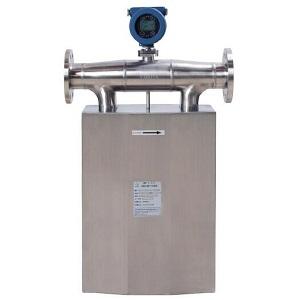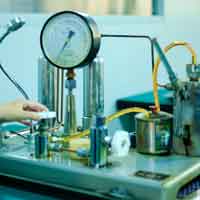
A Coriolis flow meter applies fundamental physics leveraging centrifugal dynamics to assess volumetric rates. When liquids flow along bent lines, rotational forces cause measurable deflections in fluid pathway, directly corresponding to flow intensities, permitting accurate flow analysis. Famed for their multi-application ability, optimized for broad material range with negligible head drop.
- Advantages of Coriolis Flow Meters:
- Superior precision capabilities:
- Versatile fluid handling:
- Paired property evaluation:
Examining Coriolis Meter Basics
Flowmeters of Coriolis type stand as effective instruments employed to determine accurately in ductwork. Exploiting Coriolis force mechanics, they assess flow through force-induced distortions. Inside swirling pipes, the stream undergoes sideward deflection, in relation to fluid movement. Detectors register displacement, converting displacements to readings relative to flow volume.
- Employments of Coriolis flowmeters include:
- Production control in hydrocarbon sectors
- Food and drink industries
- Sewage management
Picking Right Coriolis Solution
Coriolis meters excel in providing fine resolution for fluid flow analysis. Yet, with a range of available models, identifying the best fit for applications may be difficult. Key considerations when securing your Coriolis flow meter include: * **Characteristics of the fluid:** The fluid tested impacts design and performance. * **Flow capacity range:** Meters run within distinct flow limits. Ensure your needs are met. * **Accuracy standards:** Different use cases call for diverse precision levels. Define these to narrow down models. * **Operational environment:** Factors such as temperature, pressure, and fluid viscosity influence meter outcomes. * **System compatibility:** Assess integration and joining with existing infrastructure.Upsides of Sophisticated Coriolis Devices
Advanced flow meters provide a diverse spectrum of strengths for industrial needs. Fundamentally, these meters offer top-tier exactness, facilitating precise throughput analysis. Additionally, Coriolis meters provide simultaneous volume and gravity measurement in one device, delivering them especially suited for complex measurement. Furthermore, their strength enables operation in hostile locales.
- Hence, these devices see widespread use in industries like oil and gas, chemicals, food and beverage sectors, and pharmaceuticals.
Innovative Calibration Methodologies
Accuracy-focused environments prioritize Coriolis flowmeter performance. Ensuring dependable, repeatable results demands modern calibration methods. These exceed basic protocols by integrating comprehensive equipment and detailed analysis.
Calibrators support precise flowmeter tuning. By comparing meter outputs with known benchmarks, technicians detect errors and apply corrections.
- Multi-point calibration, assessing various flow rates, yields comprehensive performance profiling across meter ranges.
- Advanced software assists data management and visualization, enabling error monitoring.
Consistent use of advanced calibration ensures optimal meter accuracy, driving process refinement across industries.
Resolving Common Coriolis Flowmeter Problems
Coriolis meters provide trusted accuracy and adaptability yet face occasional failings. Early issue identification is vital to reducing downtime and maintaining system reliability. Typical complications involve calibration errors, often caused by improper setup, dirty sensing components, or flow disturbances. Measurement variability may result from changing fluid properties, mechanical vibrations, or electromagnetic disturbances. Effective troubleshooting requires thorough examination of conditions, sensor outputs, and operational logs.
- Regular inspection for damage or contamination applies.
- Meter adjustment maintains accuracy.
- Observing data trends aids early detection.
- Accurate setup helps reduce interference.
Using proven techniques fixes common Coriolis flowmeter challenges, ensuring reliable fluid monitoring and operational consistency.
Coriolis Flow Meter Technology for Industrial Processes
Flowmeters deliver dependable fluid rate calculation within industrial applications. Utilizing the Coriolis effect triggered by fluid passage inside vibrating tubes, changes in tube movement patterns correspond to fluid liquid quantity. This factor enables advanced quantification of liquid motions even in rigorous environments.
These instruments cater to a wide scope of uses, including petroleum refining. Their endurance makes them favored for tough surroundings, and their data transmission enables smooth integration with manufacturing systems.
Advanced Flow Rate Monitoring with Coriolis Meters
Coriolis sensors deliver strong accuracy across wide applications. They employ rotational physics to quantify mass flow, yielding top-grade measurements under variable flow regimes. As opposed to alternative flow technologies, Coriolis sensors provide persistent readings, facilitating sharp analysis. Their dual ability to measure mass flow and density makes them ideal for in-depth flow assessments. Furthermore, medidor de coriolis Coriolis sensors exhibit reliability, thriving in tough operating situations. This combination of dependability qualifies Coriolis sensors as a leading choice for demanding flow measurement situations.Oil and Gas Industrial Applications of Coriolis Flowmeters
Coriolis flowmeters have proven themselves as robust tools in the oil and gas field. Their capacity to simultaneously measure mass flow and medium concentration renders them flexible for many operational tasks. In refining workflows, Coriolis meters facilitate monitoring gas mixtures in flow channels. They also fulfill vital roles in process regulation and guarantee trustworthy metering for accounting.Coriolis Technology in Water Management
Flow measurement devices enable effective control for precise assessment in water management contexts. Utilizing inertia principles, they monitor path change through bent tubes. This detailed data allows real-time hydration control, critical for upgrading system efficiency.
- Functions of Coriolis flowmeters in water systems address broad procedures, such as: allocating water to homes and industries, supervising water draw for irrigation and turbine feeding, and governing water flow in treatment plants.
- Benefits for Coriolis flowmeters in this area cover: superior detail, broad capacity across quantities, and minimal care requirements.
Optimizing Fluid Flow Measurement Using Coriolis Technology
Coriolis flowmeters have achieved themselves as dependable solutions for evaluating substances. These methods apply the Coriolis effect to calculate both mass flow and fluid density. Utilizing Coriolis technology can advance measurement accuracy, curtail operating expenses, and supply insightful data about process parameters. Their applicability enables use in a expansive range of fields such as manufacturing.
